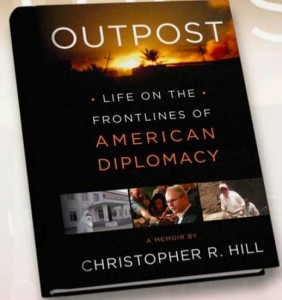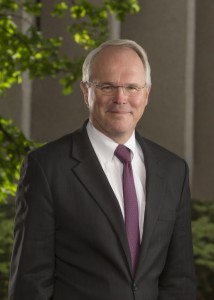Foreign Policy Blog
by Reza Akhlaghi
Ambassador Christopher R. Hill is a distinguished 33-year career diplomat from the U.S State Department. A four-time ambassador under three U.S presidents, Ambassador Hill served in Macedonia, Poland, South Korea and finally in Iraq, where he was appointed by Secretary Hillary Clinton. Some of Ambassador Hill’s most challenging assignments were North Korea, where he served as chief disarmament negotiator, as well as Bosnia and Kosovo. He was also President Bush’s assistant secretary to East Asia. Ambassador Hill is recipient of many State Department awards, including the Secretary of State’s Distinguished Service Award and the Robert S. Frasure Award for Peace Negotiations. Ambassador Hill is currently the Dean of the Josef Korbel School of International Studies at the University of Denver in Colorado and a monthly columnist for the online journal Project Syndicate. In early October of this year he published his memoir Outpost: Life on the Frontlines of American Diplomacy, which is a recap of over three decades of service at the State Department. Ambassador Hill sat down with Reza Akhlaghi of the Foreign Policy Association to discuss his new book and share his views on U.S. foreign policy.
As the world moves toward what appears to be a multipolar system of international affairs, what would you name as key strategic challenges that the United States will face over the next decade?
There are several challenges that will keep U.S. policymakers busy over the next decade, but two are particularly problematic. The first is the nuclear wannabes — Iran and North Korea. The ambitions of these countries threaten to undermine what remains of the credibility of the international nonproliferation regime. They also have the potential to destabilize regions by encouraging further proliferation; in North Korea’s case by exacerbating tensions among other states. There is no evidence for the commonly asserted point that North Korea wants weapons for defensive purposes. More likely, they want them to threaten their non-nuclear neighbors.
Iran’s ambitions feed into the second major challenge and that is an unstable and destabilizing Middle East. The Arab world need not be beset by sectarian enmity for the rest of history. But so far, it has failed the test of political modernization during the Arab Spring. The Arab world seems to be undergoing a process by which the authorities of national states in the region are waning and being replaced by patchwork quilts of sectarian and even tribal identities. Border changes may also be in the offering, a process that will most likely lead to more conflict. In the meantime, great powers, especially the United States, have become increasingly immersed in their own domestic political tensions and for now unable to play a stabilizing role.
How do you think the United States will manage the rise of China? Are we in the early stage of an emerging Chinese-Russian economic and security axis?
China has not behaved well in recent years, especially toward smaller neighbors in Southeast Asia. This pattern of behavior (which is often a mirror of its internal churn requires firmness from the United States. But overall, the U.S. will continue to manage relations with China as it has done for the last seven presidencies with a combination of cooperation and competition. It will not be pretty at times, policy will sometimes look like a Christmas tree of constituency issues where the setting of priorities will continue to be an elusive concept for any U.S. president managing the ugliness of the domestic political scene, but overall, the relationship will go forward. At the end of the day, it is a relationship that is too big to fail. As for a renewed China-Russia axis, they will indeed find common cause from time to time, but, again, in the long run, China — and Russia for that matter — has no choice but to be a responsible global stakeholder. This will be a more difficult process for Russia than for China.
The establishment of an Islamic caliphate in Iraq and Syria, Bashar Assad’s unbridled brutality, an unresolved Israeli-Palestinian conflict, and Iran’s controversial nuclear program have kept the United States quite absorbed in the Middle East, which brings me to the question of whether the Obama administration’s strategic “pivot” to Asia Pacific is stalled today. Given your experience in East Asia, where does the Asian “pivot” stand today? Is the “pivot” perceived by the states in northeast Asia differently compared to those in the southeast?
The pivot was a much oversold large muscle movement that ended up having more unintended consequences than it did consequential policy. It was intended to answer the age-old issue in U.S foreign policy of whether we are a Pacific country with all the promise of that dynamic part of the globe, or whether we remain more focused on old relationships and interests across the Atlantic. The obvious answer is that we have to be both, but the unintended consequences of the “pivot” was the perception of a retreat from the Middle East that sadly corresponded with the Arab Spring, an increasingly neglected Europe (which, to be fair, was doing its own share of neglecting the transatlantic links while it focused on its own identity issues), and finally the perception that the U.S. was “back” in Asia to confront China.
No question the United States has had to become more involved in the Middle East notwithstanding the pivot. The crisis of Islamic State has shaken the established order of the region as much as the Arab Spring did. But getting re-engaged is sometimes a more difficult process than just becoming engaged, and the perception that the U.S. lost its focus has undermined old relationships and changed the restarting point of those relationships. The U.S. has never been so out of sync as it is with Israel today. And the quality of the relationship with Saudi Arabia has plummeted ever since the 2003 Iraq War due to the Saudi perception that the U.S. bungled its way into creating an Arab Shia regime in Iraq, the only such regime in the region, and in so doing created new strategic challenges for the Saudi leadership. The growing sectarian politics of the Middle East has exacerbated Arab-Iranian relations and most disturbingly created a Saudi and Gulf State ambivalence about how to manage the ISIS crisis.
For starters, the United States needs to formulate a policy for Syria around which international support can rally. Then it has to begin a painstaking and frustrating process of encouraging the warring parties to agree to something that sets out Syria’s eventual political system (i.e., a cantonized, loose federation). It is not going to be easy, but it is better than a desultory call for Assad to go away while calling for provisional elections to form a provisional government and constitution.

For starters, the United States needs to formulate a policy for Syria around which international support can rally. Then it has to begin a painstaking and frustrating process of encouraging the warring parties to agree to something that sets out Syria’s eventual political system (i.e., a cantonized, loose federation). It is not going to be easy, but it is better than a desultory call for Assad to go away while calling for provisional elections to form a provisional government and constitution.
“OUTPOST: Life on the Frontlines of American Diplomacy,” Simon & Schuster. 432 pages.
As you point out in your book, upon coming to office, among key objectives of the Obama administration in Iraq was to avoid squandering the fragile gains of previous years and wind down the war and bring home U.S. troops. With these recent developments in Iraq in mind, what is your assessment of America’s Iraq policy today?
There are no good policy choices in Iraq today. The basic approach of encouraging more Sunni outreach in Baghdad while helping Iraqi and Kurdish forces defeat ISIS is about right. Sunni outreach is important not because the Sunnis are prepared to live under the Shia rule — even with Prime Minister Haider al Abadi–but rather because it is the best way for us to begin the difficult process of making amends with the Saudis who detested Maliki. If there is one surge we really need now it is a diplomatic surge with the Saudis and the Gulf States who are a big part of the ISIS problem.
In your book you mention that the surge of troops in Iraq appears to have “many fathers eager to see their names in the history books”. Who, in your view, should be chiefly credited for the troop surge in Iraq?
The person who deserves credit for sending in more troops to Iraq at a time when everyone else was calling for pulling them out was President Bush. He was in the hot seat, and definitely, to borrow his phrase, the decider. It was not the think tankers, not even the generals. But the surge in Iraq, which involved several sets of parallel, albeit related, issues including reconciliation among Sunnis, if not between Sunnis and Shia, became way oversold as the solution to all our problems going forward. It was oversold on a tactical level as well as on a strategic level when it became the missing ingredient to realize the goal of achieving a world that can be brought to our way of thinking. No one speaks today about the fact that the first big decision by President Obama was to acquiesce in a troop surge in Afghanistan, a strategy that did not work.
As part of your criticism of what you view as an excessively militarized foreign policy, you suggested that Iraq was seen as “a security situation rather than a political problem involving local players and that politics became reduced to another element of counterinsurgency (COIN).” How do you see this dynamic playing out in Iraq today under John Kerry? Is it changing?
COIN strategy involved the realization that wars of the Iraq kind could not be won only in battle, but required a heavy degree of working with civilians. Thus, the State Department became a kind of follow on force to the military. The State Department also became a kind of scapegoat when things did not go well (e.g., having an irascible prime minister such as Maliki). Today, there is a much broader understanding that the problems of Iraq, even in the context of civil war, are political. No reasonable person perceives John Kerry as having the job of implementing Centcom’s strategy.
What is your assessment of the nuclear talks between Iran and the P5+1 countries? Is it the right time for a U.S.—Iran rapprochement and should there be one, would it lead to deterioration of U.S.—Arab relations as some suggest?
The U.S.-Iran talks are extremely important not only for nuclear proliferation, but also to help calm down the Middle East. If the U.S. is successful in ending Iran’s support for Shia Arab terrorism and for otherwise meddling in Arab-Israeli issues, it could be transformational for the region. The worst reason for not proceeding with talks (or worse, for undermining those talks) is that the Arabs don’t like Iran.
You have argued that in U.S foreign policy today “finding practical answers to tough problems has taken a backseat to ideology.” Can you explain what you mean by that?
The world is complicated enough without adding our own layers of ideology to it. We need to be guided by a compass that includes human rights to be sure, but we need to be careful about assuming that our values are always international values, or that we can mold the world to our image by hectoring everyone to be like us. In the fullness of time, this interval of U.S. supremacy will be seen as a benign period of single-state hegemony. But for now, many parts of the world want to see our engagement and a steady hand, but without the finger wagging.








